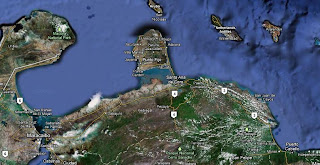
It has been some months without posting, but surely the petrochemical news have been really interesting, so I expect to write more often from now on.
To get into shape for further posting, I will start by reviewing the current developments being done in the western part of Venezuela, specifically in Paraguana. Originally planned to be built in the east, the whole petrochemical complex was switched next to the biggest refinery in Venezuela (and biggest of the world until not so long).
The petrochemical complex will have the following plants:
- 800 kta of Polyethylene Terephtalate (PET)
- 600 kta of PTA (monomer for PET production)
- 600 kta of Styrene monomer
- 200 kta Acetic Acid
- 350 kta Monoethylene Glycol (MEG)
- 400 kta Polypropylene (several?)
- 250 kta Polyethylene (several?)
At first sight Pequiven's strategy is to take advantage of the availability of raw materials as well as the cost advantage of them.
As expected the developments are thought in the as close as the oil business as possible.
In following posts I will discuss how much of these developments will serve international and internal markets.







